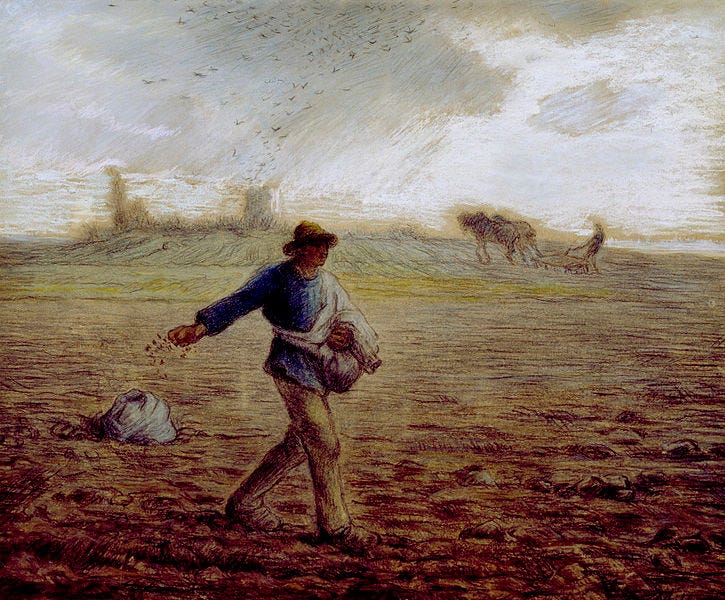I’m thinking of our Word of the Week, season, because we’re about to enter one, here in New Hampshire. That is, spring is somewhere around the corner. No blooms are on the trees yet, and we did get some freezing rain yesterday and snow flurries today, but the crocuses are coming up, the first of flowers in the spring, and the grass is greener than it’s been in quite a while. Of course, our friends in Tasmania and the Argentinian pampas are shifting into another season now too, except that for them it’s the autumn; and in a lot of places there’s only the dry season and the rainy season, or really no seasons at all. But I have always liked the seasons, as each one seems to present you with a different world, and before the industrial revolution, you really needed to know your way around the seasons: you had to know, and I guess a lot of people still have to know, when to go out fishing on the sea, when to cut timber, when to prune trees, when to shear the sheep; and one of our neighbors here knows when to tap the sugar maples for that thin liquid sap that you can make into syrup with a flavor like nothing else in this world.
But the main seasonal thing you have to know is when to sow the seed, and that depends on where you are, what kind of soil you have, and what seed you are planting. In the United States, you sow winter wheat in the early fall, and it goes dormant during the cold months. Sweet corn doesn’t do that; so you have to sow it in the late spring, after the threat of frost is past. In ancient Egypt, the main way to sow seed was to broadcast it — yes, that’s what “broadcast” really means, to fling something abroad at random — in the rich mud left behind after the slow yearly flooding of the Nile River. Flooding in Egypt was generally gentle, predictable, and beneficial; the wider the floodwaters, the richer the harvest would be. In Mesopotamia, though, the Tigris and the Euphrates, mighty rivers, had to be controlled against flooding and for irrigation, which is why they dug drainage ditches and spillways over extents of hundreds of miles. There, you couldn’t rely on what the water was doing — you had to build those water-works and take careful note of the sky, which is why it’s no surprise that the Chaldeans became keen astronomers and mathematicians. Their main crop was barley, I believe, and they were the inventors of beer, which was a lot less of a problem for drinking than was the often stagnant water. They’d have it in a big tub, and you’d sit around it with your friends and drink from the tub through a reed. I know it doesn’t sound appetizing, but they liked it.
I said that you had to know the season for sowing the seed, and all those words are in fact closely related. Season comes into English with the Norman French saison, which is a daughter of the Latin noun satio, sowing. If you want to know where the n in the word came from, keep in mind that in Latin’s daughter languages, nouns came not from the nominative singular but from the other cases, which when you put them all together were more common than the nominative singular alone: so saison really comes from sationis or sationi or sationem, and so forth. As for sow and seed, they come from our old stock of Germanic words, and they are cousins of saison, not parents or children. These all come from the ancient Indo-European root se-, which meant in fact to sow: as in German saen, to sow, Old Irish sil, seed, Latin serere, to sow, and Old English saed, seed. You might not think of it that way, but a seminary is literally a seedbed, which is supposed to sprout up in learned men for the Church.
“Well now,” you ask, “what about seasonings? Is that the same word?” And the answer is yes, it is, but we’ve got to think about it a bit. The application comes from what you do to wood — to timber, for building or carving. Something that’s been seasoned has been allowed to rest a while. You want to carve or build with cedar? You let it sit for at least a year, and perhaps for several years if it’s a thick plank; I’m sure that plenty of you know more about this than I do. But there are things you can add to something to help the process along, or, thinking of things from the other direction, to keep away a process you don’t want. Salt is a great preservative, but other seasonings can at least take up part of the role of salt, and they don’t overwhelm the flavor, as a lot of salt must do. Anyhow, spices were, along with silk, pearls, and drugs, a great impetus for world trade in the Middle Ages. Imagine northern European food without cinnamon, cardamom, cloves, nutmeg, pepper, saffron, and ginger!
One more use: Saint Paul says to Timothy that he must preach the word eukairos akairos, which the King James translators rendered happily as “in season, out of season,” as the Greek kairos means time, not as a duration, but as an age, a season, an occasion. Now you’ll see it translated as “when it is convenient and when it is inconvenient,” but that’s too abstract. Kind of without taste, right? Like apple pie without cinnamon, or steak without a little pepper, or gingerbread without ginger — or the last day of March in New Hampshire, without the crocuses coming up.
Listen to this episode with a 7-day free trial
Subscribe to Word & Song by Anthony Esolen to listen to this post and get 7 days of free access to the full post archives.













